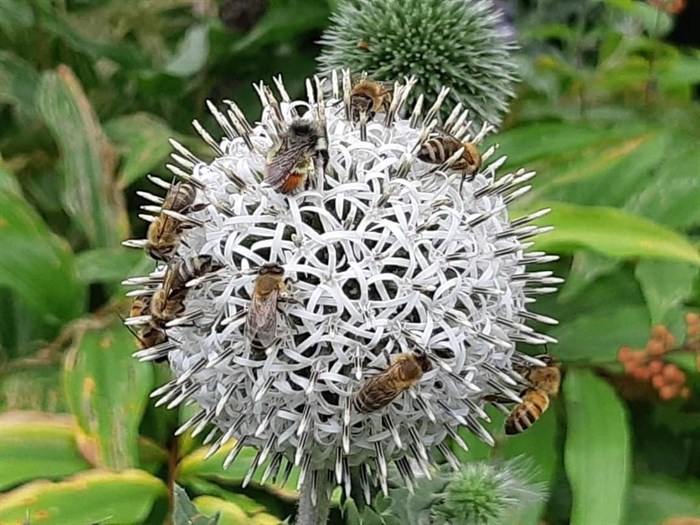
Globe Thistle plant with honey bees at Bolean Gardens in Falkland.
Image Credit: SUBMITTED/ Brad Ulmer
April 13, 2023 - 6:00 AM
Experienced Kamloops beekeeper Murray Willis lost more than a third of his honey bees over the winter, and that’s not bad compared to many others this year.
An active member of the bee community, Willis manages over 50 hives of his own, and said some keepers in Kamloops and surrounding areas lost 50% to 100% of their bees over the winter.
“Losses are generally higher than usual,” he said. “Some keepers say it’s from cold weather or too many mites.”
In fall, queen bees lay eggs that turn into baby bees called winter bees that must sustain the colony until spring, when pollen comes into the hive and the queen starts laying eggs that become summer bees, or worker bees.
Chief Apiary inspector for the province, Paul van Westendorp, pointed to a lengthy summer that quickly transitioned to winter, which took its toll on winter bees.
“The winter bees are more sedentary,” he said. “We didn’t get a big population of winter bees and they couldn’t keep warmth inside the hives. They sit there trying to vibrate to make heat and starve to death.”
van Westendorp oversees 63,000 colonies managed by upward of 4,500 beekeepers in the province, predominantly hobby beekeepers. For the next several weeks, winter mortality surveys will be conducted and information collected from keepers. More concrete statistics will be published on the government site at the end of May.
He said honey bee losses have steadily increased over the last few years and he doesn’t have a definitive answer why, but that a broader focus on agricultural biodiversity is needed.
“It’s time for us to place more attention on the world that is making it possible for us to live and eat,” he said. “In the Interior there are not many crops other than alfalfa that benefit bees. In the Fraser Valley, blueberries are the key crop. There’s an important relationship between keepers and fruit producing industries.”
READ MORE: What Kamloops and Okanagan honey bees do during winter
van Westendorp said modern agriculture is organized in a way that reduces biodiversity by creating mono crop fields and using chemicals that harm the natural system.
“We need to refit our thinking patterns and work to coexist with small creatures,” he said. “Publicly funded programs are needed to create spaces not for harvest but to maintain and support diversity.”
READ MORE: Bat research study venturing to B.C. Interior caves
On the positive side, van Westendorp is seeing more interest in learning about bees, and growing numbers of people signing up for the government webinar course he started up eight years ago.
Go here for information on bees, bee courses and population statistics.
To contact a reporter for this story, email Shannon Ainslie or call 250-819-6089 or email the editor. You can also submit photos, videos or news tips to the newsroom and be entered to win a monthly prize draw.
We welcome your comments and opinions on our stories but play nice. We won't censor or delete comments unless they contain off-topic statements or links, unnecessary vulgarity, false facts, spam or obviously fake profiles. If you have any concerns about what you see in comments, email the editor in the link above.
News from © iNFOnews, 2023